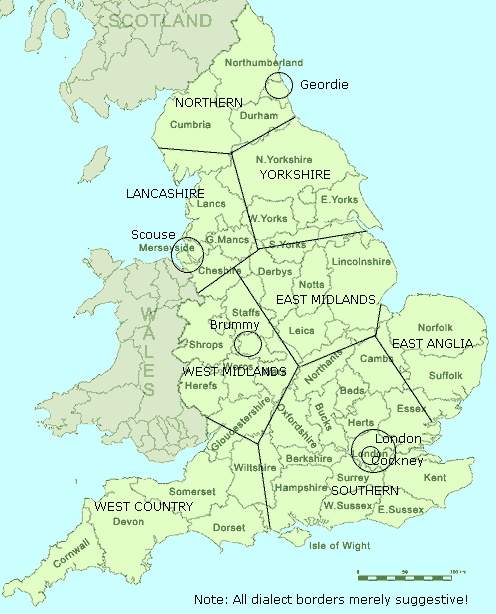terça-feira, 28 de agosto de 2007
British English: what it isn't
Ok, you would probably assume that Standard English is not the object of this blog. Here, however, Peter Trudgill explains why Standard English should be considered a dialect, by rejecting other statuses such as language, accent, style and register. Very interesting article on the subject.
quarta-feira, 22 de agosto de 2007
Sounds familiar?
The British Library offers this little gem about accents and dialects in the UK. It might help any student who research for accurate information on the subject, with illustrations and even a map with links to actual recordings of accents throughout the country.
In Regional Voices, there are interesting explanations on specific topics such as lexical, phonological, grammatical and social variations.
For those interested in Case Studies, there is an in-depth material concerning three specific varieties of contemporary English: Received Pronunciation, the Geordie Dialect and English as spoken in the UK's minority ethnic communities.
Learning through experience
In this small and curious video, an American guy shows his abilities on different accents, starting from the so envied RP British English. It is somewhat interesting the way he shifts to American Southern accent.
If you really want to check out RP British English in all its splendour, be sure to indulge yourself with this personification of it. God save the Queen!
Just for fun...
terça-feira, 21 de agosto de 2007
At's me book you got 'ere!
Professor Henry Higgins would never approve of this, but you ought to have an insight into one of the more famous and stigmatized dialects of British English. Cockney, the symbol of London's working class identity, has it's own rhyming slang, which is a set of expressions used to replace common words they rhyme with, to the point that non-Cockney English speakers have to rush to a very unusual dictionary or even an online translator.
If you want something more practical on Cockney, try to figure out what Bob is saying. If not, please refer to this website mantained by the Language Samples Project developed in University of Arizona.
segunda-feira, 20 de agosto de 2007
Local ID
domingo, 19 de agosto de 2007
Resources, resources...
There are rich resources on the web about dialects of British English. Universal Teacher, for example, presents this extensive guide that defines the term dialect, discusses topics like social functions of dialects and historical changes, as well as exposes some features of traditional dialects.
Some aspects of British English are roughly summarized by this other webpage, which sends us to topics like the Queen's English.
Finally, find yourself immersed in experiencing the "local colours" of different dialects of British English and understand their distinctions from other English varieties.
Further reading
If you miss real books already, here are some which can be found at the library of University of Sao Paulo:
- Dialects of English: studies in grammatical variation, by Peter Trudgill and J.K. Chambers;
- English Dialects, by G.L. Brook;
- Variety in contemporary English, by W.R.O'Donnel and Loreto Todd.
Otherwise, you can shop at Livraria Cultura:
- English accents and dialects: an introduction to social and regional varieties, by Peter Trudgill, Arthur Hughs and Dominic Watt;
- An atlas of English dialects, by Clive Upton.
Subscrever:
Comentários (Atom)
